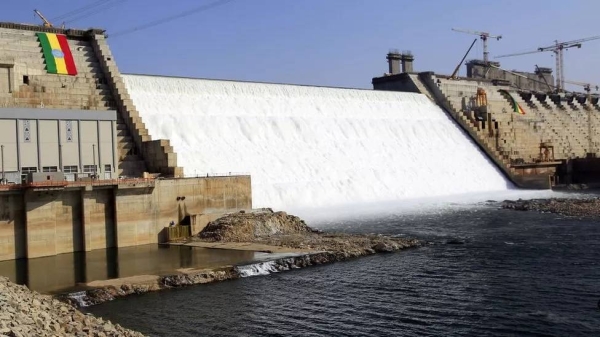
Ethiopia has allowed a controversial dam built across the headwaters of the Nile to fill with rain water, raising tensions with Egypt and Sudan.
The huge hydroelectric project on the Blue Nile, known as the Grand Renaissance dam, is at the centre of Ethiopia’s plan to become Africa’s biggest power exporter, but Egypt fears already limited Nile waters, on which its population of more than 100 million people depends, might be restricted.
“The construction of the dam and the filling of the water go hand in hand,” Seleshi Bekele, Ethiopia’s water minister, said on Wednesday.
He denied that Ethiopia had decided to begin the process of filling the dam, but confirmed analysis of recent satellite images that showed the reservoir swelling.
Ahmed Hafez, the spokesman for Egypt’s ministry of foreign affairs, said his country “requests urgent official clarification from the Ethiopian government”, on whether filling the dam had officially begun. “Egypt continues to follow developments raised by the media on this issue,” he added.
Egypt’s foreign minister, Sameh Shoukry, told the Alghad TV channel days earlier that any “significant harm” to Egypt’s water security by the dam constituted “a red line”. He said Egyptian authorities would react “firmly”, as “significant harm is illegitimate under international law”.
Ethiopia, Sudan and Egypt have spent a decade negotiating a deal to regulate the flow of water from the $4.5bn (£3.6bn) mega-project on the Blue Nile river, with talks intensifying in recent months as the end of construction work approached.
The dam blocks the river as it runs from Lake Tana in Ethiopia to meet the White Nile in Khartoum, before flowing north into Egypt. It will take several years to fill.
In early April, Ethiopia’s prime minister, Abiy Ahmed, said that construction would be completed despite the Covid-19 pandemic, with the reservoir to be filled during the rainy season, which started last month.
However, there has been no official announcement from Ethiopia that the construction needed to begin a definitive filling of the dam’s reservoir has finished.
Sudan is less worried than Egypt, and hopes to gain access to cheap electricity that would provide a welcome boost for its troubled economy. Yasser Abbas, Sudan’s irrigation minister, said on 13 July that all parties were “keen to find a solution” but technical and legal disagreements persisted over the dam’s filling and operation.
Analysts say fears of any immediate water shortage “are not justified at this stage at all [but] if there were a drought over the next several years, that certainly could become a risk”.
Kevin Wheeler, a researcher at the Environmental Change Institute at Oxford University, said the escalating rhetoric was mostly because of changing “power dynamics” in the region.
Associated Press contributed to this report












